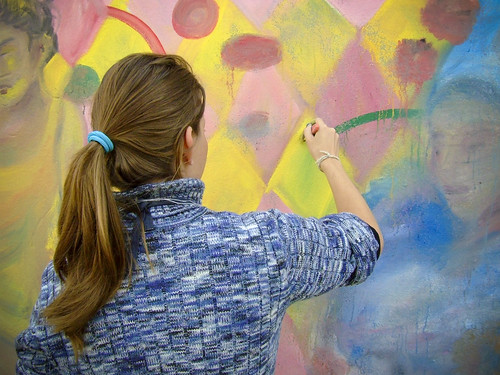Not in a pretend way. Not in a fake, pollyanna, unrelated-to-reality way.
Don’t look for the good at the expense of stock-taking or facing the truth.
There are moments that call for the courage to be clear-eyed about your life: its deficits, its ongoing flaws and the shrinking space for peace and growth. Those moments come after a long season of “trying hard” and “believing the best.” The willingness to admit, “This is not working,” is a brave admission and can lead to a different kind of good—the costly kind, that requires change and overhaul, but leads to a new season of opportunity and tranquility.
The kind of “looking for good” that I mean in today’s message is not the kind explained above.
It’s a different kind. Look for the good beyond the obvious interpretation of events.
Look for the good—in the intention behind the action.
Your child who got glue on the new table to make you a card. The intention is right; the action is unnerving.
The phone call from the teen stranded on the roadside to tell you about a near miss with the family car—the accident avoided, the honesty to tell you the truth, the willingness to risk being “in trouble” with you is the good.
Look for the good—as if you were holding a camera.
Your toddler pours the spaghetti on her head in the new Hanna Andersson outfit—it’s a moment to capture for future memory-savoring.
You feel anxious about bills unpaid and see, across the room, four children building a tower of blocks in perfect harmony. The good.
Look for the good—in progress.
Your child is not reading yet, but he’s more interested in books than he was two months ago.
Your teen is not sharing her feelings with you today, but she smiled at you spontaneously.
Look for the good—in the big picture.
This week might have been hurried and harried, but the overall pace of your life in the last year is calmer, less hurried. You can get back to that.
Your 10-year-old is struggling with division, but your 13-year-old isn’t and that gives you hope for the 10-year-old.
Look for the good—in your home.
Its coziness, not its dust bunnies.
Its family-friendly messes, its corners that house your memories, the taken-for-granted nature of the space you call home, the funds to pay for the roof over all your heads—fabulous good.
Look for the good—in yourself.
You’re trying, every day.
Trying to be kind, trying to trust the process, trying to add new methods to your work, trying to laugh and love, trying to hold back your temper or exasperation, and succeeding sometimes.
You have shining moments of success where you know your children are happily bonded to you. You know that when you are not connected, there is a path back because you’ve taken it before.
Look for the good—it’s there, underneath the muddy shoes, next to the hidden math book that you can never find, behind the eyes of your tired emotional teen, inside where you can be gentle with yourself.
Keep going. <3
Cross-posted on facebook.






















